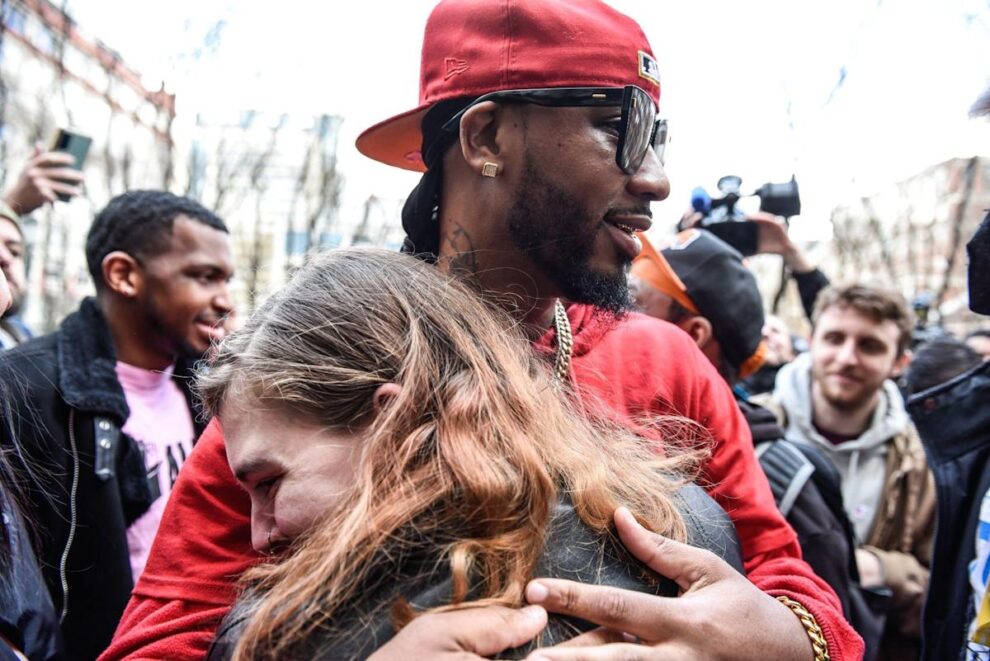
(Bloomberg) — Two years ago Amazon.com Inc.’s general counsel suggested focusing public attention on fired employee and labor activist Christian Smalls because he “wasn’t smart or articulate.”
Most Read from Bloomberg
On Friday, Smalls led the fledgling union he founded to victory at one of Amazon’s New York warehouses — a seismic event that could upend the relationship between Amazon and its workers as well as help revitalize the struggling U.S. labor movement.
After winning an election in Staten Island, Smalls celebrated his victory with a few choice words of his own. “Amazon tried to make it about me from day one,” he said. “It’s always going to be Amazon versus the people and today the people have spoken, and the people wanted a union.”
Then the characteristic Smalls zinger: “We want to thank Jeff Bezos for going to space because while he was up there we were signing people up.”
To be clear, Smalls’ Amazon Labor Union won an election at just one warehouse, a result the company signaled it will fiercely contest. Negotiating a contract, assuming Smalls even gets that far, won’t be easy. Still, he’s just getting started.
A second vote is set for another Amazon warehouse in Staten Island, and the ALU is trying to sign up workers at two other facilities in the New York borough. Moreover, Smalls is emerging as a folk hero and potential guide to frontline workers all across the country, people who toiled through a dangerous pandemic and are now looking to redress the power imbalance between themselves and their employers.
“Win one warehouse and everyone will understand you can stand up to billionaires,” said former AFL-CIO organizing director Richard Bensinger, who has been spearheading a surprisingly successful union campaign at Starbucks Corp.
Unions have often been wary about pursuing labor board elections against powerful corporations, leery of business-friendly U.S. labor laws that let companies hold mandatory meetings to try and persuade workers that a union could leave them worse off. Even if employers fire organizers, they typically suffer minor penalties.
The ALU’s victory against Amazon showed that the seemingly impossible is possible and that a grassroots campaign can be surprisingly effective. Some activists, including Smalls, have argued that the Retail, Wholesale and Department Store Union lost an election last year at an Amazon warehouse in Bessemer, Alabama, in part because its organizers were perceived as outsiders who didn’t understand the local conditions.
The RWDSU did much better in a second election that coincided with the Staten Island showdown. The union had a freer hand to make its case in Bessemer than it did last year, when the pandemic was still raging. The RWDSU is trailing by a little more than 100 votes and could possibly win once 416 disputed ballots are reviewed.
Read more: Amazon Fired and Disparaged Him. Then He Started a Labor Union
Partly because he didn’t have much money and partly because he’s fond of the dramatic gesture, Smalls deployed confrontational tactics — tweeting photos of labor consultants he deemed “union-busters,” encouraging employees to disrupt the company’s anti-union meetings and handing out literature in the facility’s parking lot.
Smalls was even arrested at one point and charged with trespassing, resisting arrest and obstructing governmental administration. (He said a judge adjourned the case for six months and will dismiss the charges so long as he isn’t charged with a crime during that time.) Amazon said it called the police after warning Smalls multiple times that he wasn’t allowed on the property — a decision some labor experts predicted would backfire on the company.
The ALU’s approach clearly resonated. Justine Medina, who previously did gig work, decided to get a job as a packer at the Staten Island warehouse after following the campaign. “I wanted to help the labor movement, and for me that meant putting myself where my values lie,” she said.
Other workers said they were similarly inspired, a sentiment that helped the ALU win 2,654 yes votes versus 2,131 no votes. “It proves what we’ve said over and over again,” said Kate Bronfenbrenner, the director of labor education research at Cornell University. “You have to do the work on the ground.”
Sara Nelson, president of the Association of Flight Attendants, said the broader labor movement should heed Smalls’ D.I.Y. success. “Any kind of attempt to control the excitement and the creativity and the spontaneity of the awakening of solidarity is a foolhardy action,” she said.
Like other union officials, Nelson said success in one place can motivate workers in another and that the recent campaigns at Starbucks and Amazon have already inspired more employees to get involved in efforts such as her own union’s campaign at Delta Airlines.
“Just the vote alone in Bessemer made the phone ring off the hook,” she said. “The workers are ahead of us, and we’ve got to run to catch up to them.”
Most Read from Bloomberg Businessweek
©2022 Bloomberg L.P.












